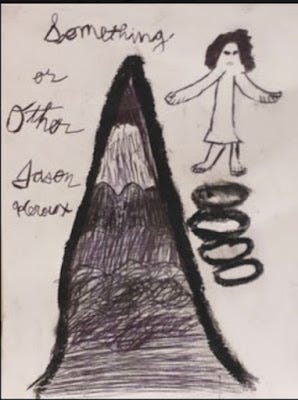On Reading/Writing/Being Something or Other
A review of Jason Heroux's wonderful above/ground pamphlet.
cover art by Samuel Strathman
Rob Mclennan’s venerable above/ground press is planning to publish my chapbook $19.99 for Supplements and Freedom. I’ve been looking for poetry community, and I felt like if I was in the club to some degree, I should be in the club. So I signed up for the press’ pamphlet subscription service, which means I’ll get dozens of zines and chapbooks and pounds of poetry mailed to me through the year. I’ve been slowly and delightedly going through the first big box I got. Some are good, some are less good—and then there’s Jason Heroux’s Something or Other, which is fucking amazing.
The pamphlet is about 32 pages, and consists entirely of poems titled “Something” and poems titled “Other.” This is one of my favorites.
OTHER
Other
than
the cloudsthe sky
is clearOther
than the waterthe river is dry.
In another (other) poem, Heroux defines “Other” as “a person or thing that is different or distinct from one already mentioned or known about.” It’s a word that only exists as an alternative to some other word or concept. As such, other is a convenient, or glib, or haunting way to point out that every something is an other to something. You don’t need to be Saussure to notice that words and concepts have meaning only in relation to each other; the other is the something of some other something or other. The other is an excess, an impurity, a shadow. It defines something and is defined by something. It’s nothing in itself, but everything that something is not.
Other is a word game; other is a joke; other is Zen. All of those combine in this short, strange Other poem, which functions as a kind of (other) koan. Except for the other, the sky is clear; except for the water, the river is dry. The spaces in the poem open up onto the emptiness of the content (of course if you take out the clouds the sky is clear!) and to the content of emptiness (can the river be separated from its water? Is the river just a word game—and where then is the river in this poem?) The plain language—short words, two to four beats per line—create a meditative, ritual thump as the poem moves towards something, or nothing, or other. Other than/the words,/the poem/is a blank. Other than you, there is no reader. Each something can be an other that is not if you remove an other from something.
Image: The Colorado River, including water. Photographed by Paul Hermans, CC
The poem creates itself and disappears into itself, showing you the nothing that’s there and the nothing that isn’t. It’s a profound spiritual insight and a stupid dad pun. It’s maybe about how the universe is a stupid dad pun tripping us up and dumping us in the dry river as we look around for an other. It’s about the sky clearing so you can see those stupid clouds, floating like blobs of consciousness or something. It’s about writing a poem out of nothing and getting something through the sheer force of moving the words (or the clouds, or the water) around.
If “Other” makes something from nothing, the poem on the facing page, called “Something”, seems determined to take the title subject and make of it some other nothing.
SOMETHING
Something hit my window
and lay stunned in the grass
I thought something was dead but when I sprinkled water over something it woke up. A few minutes later something flew away. For something to be called something it needs a name. When it rains something wiggles out from the soil.
Something has two heads. If you cut something in half both halves live. We put something on our hooks to catch something in the lake.
“Other” is a philosophical statement; “Something” is more like a narrative with gaps which you are invited to fill in. “Something hit my window”; “I thought something was dead.” From context, you can put together what those “somethings” are. A bird hits the window and lies in the grass; the narrator sprinkles water on it until it wakes up and flies away. Then a worm wriggles out of the soil; you can put it on a hook to catch a fish.
That’s the basic “story” of something. But there are also semi-mysterious interpolations (an other) in the narrative. “For something to be called something it needs a name.” Is that a comment on the “something” that flew away? Or is it a continuation of that something’s story? Or what about “Something has two heads”? Is that about the something that crawled out of the soil? Earthworms don’t have two heads, but flatworms do, or can. Is this some sort of earthworm/flatworm hybrid we’re talking about, or does Heroux have multiple worms on his hook?
Image: Something. Photographed by Bernard Picton, CC
That’s the (some)thing about “Something.” You can decide what something is. But something wriggles out—or thumps into the pane. Are you reading about different somethings? Or is it all one something with multiple heads? Something flies into the window; something crawls out of the ground; something needs a name and something is cut in two. Everything can be one variegated, flying crawling hooking thing, or everything can be different things, depending on how you water it or cut it up. The thing that hits the glass and the thing that is almost dead could be two different birds, or two different things other than birds. The something that flew away could be the something wriggling out of the soil. Is “something” the name or the lack of a name?
Something is about the nature of storytelling and of words and poems. Heroux is creating something that wasn’t there—or perhaps using something to translate something into words. Something he is trying to say, perhaps, is that language transmits the reality of something imperfectly. The poem (if it’s a poem) evokes, but can’t fully delineate. Something is left out. Or something creeps in, out of the ground.
Something is so various, and has so many heads, it’s hard to know how to hook them all. Or alternately, maybe the heads are just ours, and the names we give to something are just a sad effort to contain it, like a riverbank pretends to hold a river, which is in fact only water solidified for a moment before it returns to mist, falls as rain, runs to the ocean, becomes clouds.
The delight of something or other is that it’s constantly shifting you from something to other; each sentence or poem is nonsense about nothing, or about some words, or about some other thing, or every other thing. Heroux is constantly faceplanting into profundity, or transcendently taking a pie (or something) in the face. It’s poetry of sublime half-assedness and brilliant stumbling effort. I keep reading and rereading it and finding something new. Or something other. Or both.
SOMETHING
I have something
you want to share
with me. Something is a particular or unidentified or undefined item or event, mostly unnamed, usually unknown. Something is what I feel inside a pocket if I feel inside a pocket. Something is what we call the thing we aren’t sure what to call. Another word for something is pumpkin. Another word for something is peppermill. Another word for something is radiator. Another word for something is windowsill. How you say something depends on
the languageI speak
__
Heroux’s book inspired a poem for one of my latest projects. Basically I ask ChatGPT a question or two and then chop up, repeat, and garble the response. I thought I’d put the poem/thing here for paid subscribers, in case you wanted more of something. Or other!





